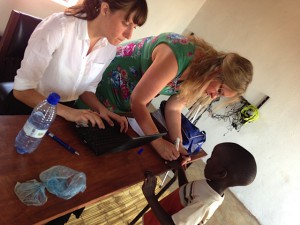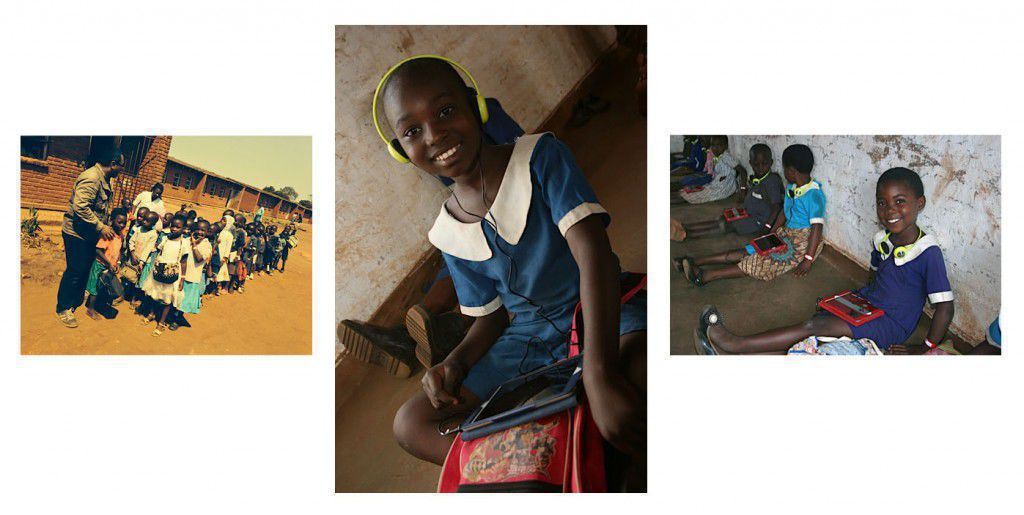Languages at primary school – what’s the point?
From September this year, it’s going to be compulsory for primary schools in the UK to teach a foreign language. This is causing quite a lot of stress for schools, according to a report published earlier this week, which says that 29% of teachers don’t feel confident about teaching a language to their students. That’s hardly surprising, considering many teachers haven’t studied languages themselves since their GCSEs, which for some will have been quite a while ago.
But despite this, the report says, 85% of primary schools have said they believe making languages a requirement is a good move, and many are already tackling the situation head on by introducing languages before it’s required by law.
 So what exactly is the point of teaching languages at such a young age? Many people will argue that the curriculum for children is already too full, with a need for English, maths and science, as well as citizenship, history and physical education, to name just a few. Why squeeze in yet another subject, especially in a world where many people believe that ‘everyone speaks English’?
So what exactly is the point of teaching languages at such a young age? Many people will argue that the curriculum for children is already too full, with a need for English, maths and science, as well as citizenship, history and physical education, to name just a few. Why squeeze in yet another subject, especially in a world where many people believe that ‘everyone speaks English’?
Learning a language is good for your brain
Well firstly, learning a language can actually make you smarter. The positive effects are well documented – bilingualism makes you better at problem solving, planning and verbal reasoning. Research by psychologists at Penn State University has shown that if you’re bilingual, you’re likely to be better at multi-tasking, because your brain is used to ‘mental juggling’. And other studies have shown that learning another language can help to delay the onset of dementia in later life.
It makes you better at your native language
Studying a second language helps you to understand your own, because it makes you think about how language is formed. Because I grew up speaking English, I don’t really remember learning the rules of the language; they just came naturally. But when I took up Spanish, suddenly I needed to think about grammar, and about how I was structuring sentences, which is much more important in Spanish than in English. For example, in Spanish you can’t end a sentence with a preposition, which made me realise how often I was getting away with this in English. And I would never have even known the subjunctive existed if not for my Spanish studies (although I’m not going to lie and say I use the subjunctive regularly in English!).
Learning a language prepares you for the rest of your life
I don’t just mean learning languages at secondary school, although it’s likely that children who leave primary school with some knowledge of another language will want to continue it when they move on. I mean beyond school – when the time comes to choose degree courses and, even more importantly, find a job. A recent article in The Economist says that employees with a language in the U.S. can earn on average 2% extra, which may not sound like much, but over time can add up to some serious money. Not only that but learning a language will make it easier for you people to go travelling and see the world; it might even help you find the love of your life!
The younger, the better
It’s a common argument that children are better at learning languages than adults; because of the way the brain develops, some scientists believe there’s a ‘critical period‘ for language acquisition. And although there’s plenty of evidence that this might not necessarily be the case (just look at Benny Lewis, who didn’t start learning languages until adulthood, and now speaks twelve languages fluently), I do think there’s something in it; after all children are constantly learning new things, so one more probably won’t phase them. And they’re also in a better position to learn than adults, who are very good at finding other things to do and worry about. (I know I am.)
It’s fun!
Some people might disagree with me here, looking back on their own language classes at school with its endless repetition of vocabulary and verb conjugations. Obviously I’m biased, but I do think learning to speak another language can be really fun if it’s put across in the right way. There are so many exciting ways to teach a language, from songs and TV shows to games and apps. The internet is full of great ideas – have a look at #mfltwitterati on Twitter as a good starting point.
Or check out the Junior Language Challenge, EuroTalk’s national competition for children aged 10 and under across the UK – it’s great fun for children, makes life easy for teachers and raises money for charity all at the same time. Just the other day we received a message from one of our 2013 finalists, who said, ‘It was a great adventure. It’s now set me off to learning languages from all over the world.’
Liz
Rising Demand for English as a Foreign Language Reveals Spain’s Biggest Educational Bugbears
Today we welcome back guest blogger Eve Pearce, with an interesting article about the demand for language learning in Spain, and its implications for the future.
It is rather ironic that while numbers of Brits studying a foreign language to A-level have dropped dramatically over the past few years, nearby Spain – officially out of one of the deepest recessions in its history but still struggling in terms of its high rate of unemployment – is undergoing a veritable boom in foreign language study, with the English language taking pole position, since some 78 per cent of all job offers demand this language from successful candidates.
 The Spanish crisis, which has rocked the nation since its commencement in 2008, has also led to a greater demand for German and French language learning, since many Spaniards are considering migrating to these countries given the bleak economic forecast. In many private nurseries and schools, the study of Chinese is all the rage as well, since parents see this language as the difference that could make or break their child’s job application in the future. This level of competition is only logical, since the forecasted unemployment rate for 2014 stands at 26.4 per cent of the population. Vice-President of the European Commission and commissioner of Economic and Monetary Affairs, Olli Rehn, recently declared that although the unemployment rate in Spain has stabilised, it continues to be “unacceptably elevated”. The situation, he claimed, was similarly bleak in Italy.
The Spanish crisis, which has rocked the nation since its commencement in 2008, has also led to a greater demand for German and French language learning, since many Spaniards are considering migrating to these countries given the bleak economic forecast. In many private nurseries and schools, the study of Chinese is all the rage as well, since parents see this language as the difference that could make or break their child’s job application in the future. This level of competition is only logical, since the forecasted unemployment rate for 2014 stands at 26.4 per cent of the population. Vice-President of the European Commission and commissioner of Economic and Monetary Affairs, Olli Rehn, recently declared that although the unemployment rate in Spain has stabilised, it continues to be “unacceptably elevated”. The situation, he claimed, was similarly bleak in Italy.
Interestingly, despite the general consensus as to the value of learning foreign languages, the Mayor of Madrid, Ana Botella’s recent address to the Olympic Committee during Madrid’s bid to host the 2020 Olympics was deemed by many to be representative of the current failure of the public educational system to meet the demand for spoken English at an acceptable and truly functional level. In many ways, this is owing to the small number of hours dedicated to English in the public system curriculum, as well as the heavy focus on textbook-style teaching (which leans heavily on grammatical exercises) rather than on fluency and bilingualism/multi-lingualism. As a result, while most students are able to successfully complete intermediate-level exercises (involving the use of the simple past tense and conditionals, for instance), they are far less comfortable when asked to speak in public or to conduct business by phone. Meanwhile, those who are able to afford it are relying more on private classes with tutors, who are able to offer students conversational practise, one of the most sorely lacking activities in many schools and academies. Many adults (who are also flocking to EFL academies or completing online courses) frequently lament not having adequately learned English at the optimal point of their lives (i.e. in their early childhood) and now, more than ever, dreams of moving to greener pastures are being put on the back burner owing to this glaring failure in the system.
What, then, is the solution for this crisis-struck nation, at least in so far as language learning is concerned? There are a number of measures educators and those governing alike need to adopt, some of which may be:
An increase in the hours dedicated to English
If students are to gain the confidence they need to speak fluently in a variety of both social and professional settings, schools should consider not only elevating the number of hours dedicated to learning English, but also, perhaps, taking a leaf out of the book of many costly British and bilingual (Spanish-English) schools, where core subjects such as mathematics and science, are also taught in English. It is of great utility for students to be confident when counting in English and to learn to solve practical problems they can encounter in daily life in a second language (e.g. dividing into fractions, comparing items by weight, adding and subtracting, etc).
Learning other subjects in English also wrests from the necessity of contracting separate ‘conversation’ classes, since students grow accustomed to expressing their thoughts in English in a more effortless manner. During his time in office, ex-Spanish President, José Luis Rodríguez Zapatero acknowledged that the flawed system of education in English was an “evident problem“, and vowed to implement new strategies into his government’s education plan. In Madrid, one in every three public schools offer between 30 and 50 per cent of their classes in English or another foreign language. The aim is to raise this figure to one in every three schools by 2015. Interestingly, neither Zapatero nor current President, Mariano Rajoy, speak English.
Government-funded EFL classes for mature-aged students
Greater access to classes run by fully qualified EFL teachers will not only help unemployed adults hone their language skills, they will also promote spoken English within the home setting, which is bound to benefit children in both a direct and an indirect manner.
The provision and adoption of useful materials in class
As spoken and listening skills are the biggest stumbling blocks for most students, the encouragement of learning through audio-visual material (films, songs etc.) should be encouraged, to increase levels of comprehension.
Specialised teacher training
Although the number of bilingual schools has increased in recent years, the number of truly bilingual teachers is currently insufficient to meet the demand. Therefore, an investment should be made in encouraging teachers to complete courses in English-speaking countries, which ensures that they will obtain the sufficient level of fluency required to elicit the same from their students.
The solution to the Spanish crisis may lie in the distant future, yet there seems little reason to wait so long for the adoption of new methodologies when it comes to learning foreign languages at school. Recent budget cuts to the Department of Education, however, have seen the country take a turn for the worse in so far as public schools teachers’ salaries and University costs are concerned, leading us to wonder if the government is willing to back the admitted need for improved language learning, with the necessary funding. Investment in education is always wise, but it is no less than crucial in times of crisis.
Eve Pearce
Languages for the future: the top ten
A recent report by the British Council has laid out the ten most important languages for the UK’s future, in political, economic, educational and cultural terms.
According to the report, the ten most important languages, in order, are: Spanish, Arabic, French, Mandarin, German, Portuguese, Italian, Russian, Turkish and Japanese. I read this list with a certain amount of smugness that I speak Spanish, German and French – although my knowledge of key languages such as Mandarin and Arabic is, sadly, next to nothing. So feel free to give yourself a pat on the back if you can speak, or are learning, one of those ten languages.
 Unfortunately, the report also indicated that the numbers of UK residents actually learning these languages, especially the ones not taught in schools, are very low. On a positive note, around 15% of people can hold a conversation in French. However, only 6% are able to do so in German, 4% in Spanish and 2% in Italian. But the figures for the other languages are as low as 1%.
Unfortunately, the report also indicated that the numbers of UK residents actually learning these languages, especially the ones not taught in schools, are very low. On a positive note, around 15% of people can hold a conversation in French. However, only 6% are able to do so in German, 4% in Spanish and 2% in Italian. But the figures for the other languages are as low as 1%.
Perhaps one of the problems is that Mandarin, Japanese, Russian and Arabic all require learners to pick up another script. This might seem daunting, but is actually really exciting. Just being able to read simple words in another script gives you a huge sense of achievement, and you’d be surprised how quickly you can begin to decipher words from what previously looked like squiggles.
Hopefully if you’re reading our blog you already know the importance of language-learning, and that picking up a new language is an adventure rather than a chore! But maybe this list will give you an idea about which language you fancy picking up – maybe it’s time to start reviving your A-level French? Or be brave and give Arabic a try? Personally, I’m working on adding Italian to my list, which is proving interesting as I lapse back into Spanish as soon as I don’t know a word!
The report recommends a much greater focus on languages in schools and that businesses should invest in language training for languages that are useful in their industry. But don’t worry if your school days are behind you – it’s never too late to learn a new language!
Alex
A step closer to one billion children
If you’ve been on our Facebook or Twitter page recently, you may have noticed some of our photos from our recent trip to Malawi. Although some members of our office are convinced we went over there to buy beans for our new coffee machine, we were actually there to run an evaluation on the success of our maths apps in schools there. Myself, Jamie, Andrew and Nicola Pitchford from Nottingham University spent 10 days in Lilongwe, Malawi’s capital, testing around 400 Malawian kids at Biwi primary school on basic maths and motor skills, as well as asking them questions about their aspirations and how they feel about school life in general.
 If you have never tried to register the names and details of hundreds of small children, and chase them all down to put the right coloured and named wristbands on each one, you might struggle to imagine the level of chaos that we experienced, with several kids coming back to try and get their photos taken twice, some losing or destroying their wristbands after just one day, and our complete inability to spell Malawian names!
If you have never tried to register the names and details of hundreds of small children, and chase them all down to put the right coloured and named wristbands on each one, you might struggle to imagine the level of chaos that we experienced, with several kids coming back to try and get their photos taken twice, some losing or destroying their wristbands after just one day, and our complete inability to spell Malawian names!
However, somehow we managed this massive task, and got down to business putting the children into groups (a red group, who will use our maths apps for 8 weeks, a blue group who will use other fun, but non-maths, apps, and a pink group who will carry on with teaching as usual). After this, we began to assess the children, running our specially-designed evaluation app on groups of around 50 children at a time.
Thanks to Nicola’s amazing organisational skills and hard work from everyone, we managed to assess all the children who are part of the study in just three days, albeit with our stress levels a little higher at the end of several hours of using our rather basic knowledge of Chichewa to explain to kids how to use their shiny new ipads (or ‘gadgets’ as they call them!). The red group will now have 8 weeks to use the Masamu (maths) apps for a few hours each week, and we will be back to assess their progress in November!
We all had an amazing time in this beautiful country, and it was fantastic to see the level of interest that there is in our project. I was particularly happy to see how far some of the children got with the assessment tasks, and how hard some of them concentrated on getting the right answers, and trying out a range of new tasks that they would never normally be asked to do. There is clearly a lot of natural maths talent there, so we’re extremely excited to see the progress that they make with the extra teaching and support we are giving them during the study.
Make sure you check out our Flickr account for loads of pictures of the goings-on at Biwi school!
Alex




